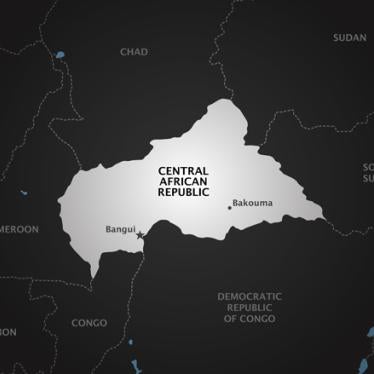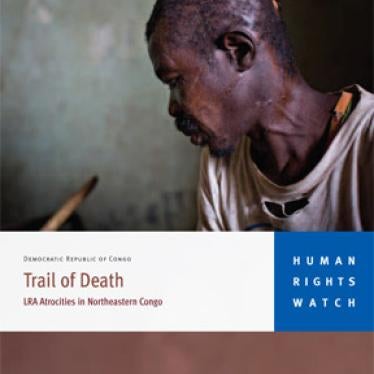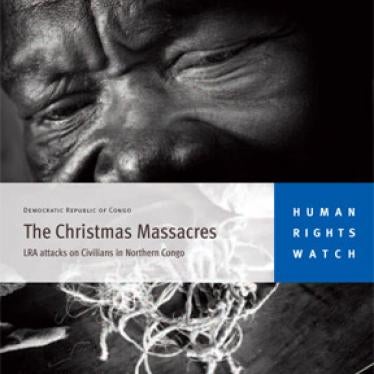(Nairobi) – The Ugandan rebel group, the Lord’s Resistance Army (LRA), carried out attacks from June 21 to 25, 2012, near a remote hunting concession outside Bakouma, in the Central African Republic (CAR). The attackers killed at least two civilians and abducted at least 14 others. The attacks followed killings of 13 civilians in the same area in March.
The attacks highlight the continued danger to civilians posed by the LRA. They also raise serious questions about the arrest of 13 employees of Central African Wildlife Adventures (CAWA), a 20,000 square-kilometer Swedish-owned hunting concession, for their alleged role in the killing of 13 artisanal gold miners in a similar attack in the hunting reserve around March 20.
“The LRA attacks on civilians in June strongly suggest that the LRA and not the jailed CAWA employees were responsible for similar atrocities in March,” said Ida Sawyer, Africa researcher at Human Rights Watch. “The government should urgently increase protection for civilians in the Bakouma area and review the charges against the hunting reserve employees.”
In a letter to the CAR justice minister made public on July 9, Human Rights Watch said that according to its investigations, the LRA, not the hunting reserve employees, probably killed the 13 gold miners. Human Rights Watch called on the judicial authorities to avoid a miscarriage of justice by fully exploring all leads in its investigation of the attack. Human Rights Watch said that protecting civilians from such attacks requires finding and holding to account those who actually carried out the killings.
Recent LRA Attacks
Witnesses reported to Human Rights Watch and a national human rights activist that from June 21 to 25, at least 30 LRA combatants carried out a series of attacks near Bakouma, Mbomou prefecture, in eastern CAR. The LRA attacked the field base of French company, Areva, whose staff are conducting uranium mining activities in the area, and the nearby villages of Lengo, Ouanda, and Denguiro. Large quantities of food, clothing, electronics, and other materials were looted from the Areva base.
In Lengo, 10 kilometers from Bakouma, LRA combatants killed a fisherman near the river on June 23. The same day, they stabbed an elderly carpenter with a bayonet and then decapitated him. When his wife heard gunshots, she ran outside their home and found her husband’s body. While she was sobbing by the body, the LRA combatants returned, beat the elderly woman, and forced her to lead them to her home, and looted all their belongings. The combatants then forced her and three men from Lengo to carry the stolen goods into the forest. She later managed to escape.
At least 10 other civilians were abducted in and around Ouanda and Denguiro. One of the men, abducted near Ouanda while buying meat, who later managed to escape, said: “There were 34 LRA in the group, men as well as women and children. Two children in the group, a girl and a boy, spoke Sango [the national language in CAR]. They told us that we were with the LRA. We were beaten a lot, especially if we didn’t walk fast enough.”
During the attack on the Areva base on June 24, witnesses reported that a large group of LRA combatants, including women and children, entered the base in the early afternoon. The contingent of government soldiers defending the Areva base quickly retreated and later reported they had run out of ammunition. The LRA then looted the base, taking large quantities of food, clothing, computers, and other materials before returning to the forest.
Civilians abducted in Lengo, Ouanda, and Denguiro said they were used to transport the looted goods from Areva toward Nzako before most were released on June 29.
March 2012 Killings
The attack in mid-March in the CAWA hunting concession in which 13 artisanal gold miners were killed was one of the largest single killing incidents in recent years in CAR.
Although there were strong indications at the time that the LRA had carried out the attack, the authorities quickly arrested Erik Mararv, the manager and owner of the CAWA hunting concession, who is a Swede; and David Simpson, a CAWA employee who is a British pilot; and 11 Central African CAWA employees. The prosecutor alleged that the CAWA employees had committed the crime to remove artisanal gold miners from the area. In June, Erik Mararv was released from prison on “sick leave”. The 12 others remain in detention in Bangui, the CAR capital.
An investigation by Human Rights Watch in the Bakouma area in March and April indicated that LRA combatants were in the area in the weeks and months before and after the massacre and were the likely killers. The manner in which the victims were killed was similar to previous LRA attacks documented by Human Rights Watch: the victims were found lying face down on the ground; some had their hands tied, and nearly all appeared to have been beaten to death with large pieces of wood, particularly by blows to the head. The attackers stripped the clothes from a number of the victims, leaving them naked or partially naked.
The case against the 13 CAWA employees has raised serious due process concerns, Human Rights Watch said. The employees were only charged with an offense on May 8, after being held for several weeks. Central African law permits authorities to hold people for questioning for 72 hours, which is renewable for another 72 hours if required, but not beyond. This limit was passed for all the 13 CAWA employees who were detained.
“It is crucial for justice to be done for the brutal killing of the 13 gold miners,” Sawyer said. “But justice should be based on solid evidence and judicial proceedings that respect the rights of the accused. If there has been an injustice, it should be promptly addressed.”
The LRA has operated in eastern CAR, northern Democratic Republic of Congo, and South Sudan for the past several years after being pushed out of northern Uganda. Since 2008, the LRA has killed more than 2,600 civilians and abducted more than 4,000 other people, many of them children. More than 400,000 people have been displaced from their homes.
The LRA has increased its attacks in the Central African Republic since the start of 2012, and it is suspected that most of the group’s top leaders are now operating in CAR. The LRA’s leader, Joseph Kony, and two other commanders are being sought by the International Criminal Court for war crimes and crimes against humanity.
In March, the African Union announced a Regional Cooperation Initiative to strengthen efforts to combat the LRA, including deployment of a 5,000-member Regional Task Force incorporating soldiers from Uganda, Congo, CAR, and South Sudan, most of whom were already deployed in the region. The Ugandan and Central African Republic soldiers deployed in CAR as part of this operation are all operating farther east, far from the Bakouma area.
In late 2011, the United States deployed 100 Special Forces to the LRA-affected region as military advisers to the armed forces carrying out operations against the LRA. While many of these advisers are in CAR, they are based in Djema and Obo, towns much farther east than Bakouma.
On June 29, the United Nations Security Council issued a presidential statement calling for implementation of the newly developed UN Regional Strategy to Address the Threat and Impact of the Activities of the LRA.
“The massacre in March and the LRA attacks in June show that greater efforts are needed to protect civilians in the area around Bakouma,” Sawyer said. “The presence of US military advisers and regional forces in the area would enhance information-gathering needed to capture the LRA’s leaders and improve protection for civilians.”







